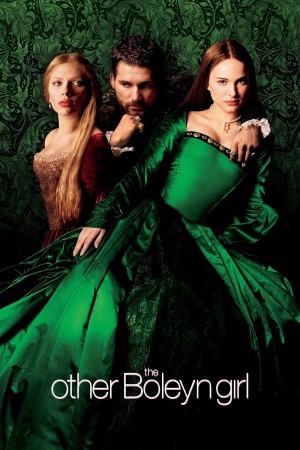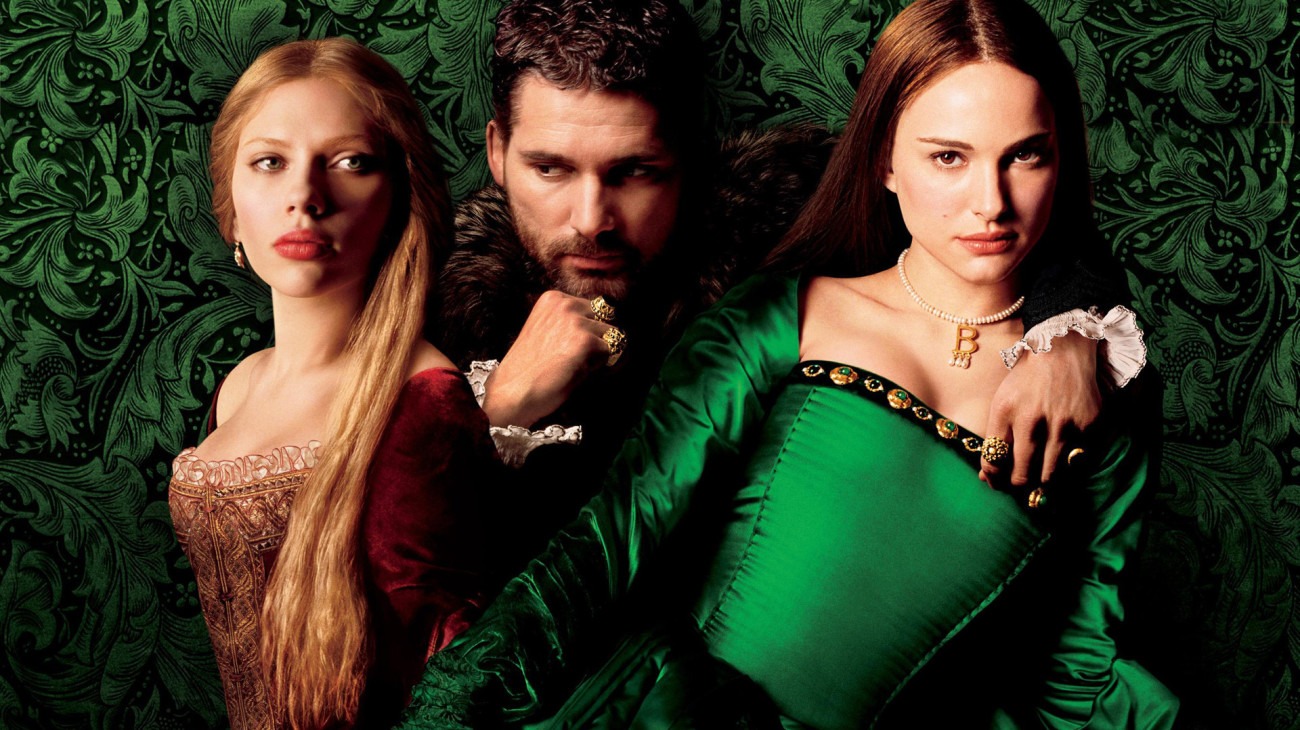
The crashing decline of the 16th Century costume drama, cont'd
I hope that all the people who slagged on Elizabeth: The Golden Age have learned their lesson. The Other Boleyn Girl commits most of the same sins as that film, but fails to be so joyfully campy, lacking as it does the same overblown sapphism as Shekhar Kapur's terrible misfire.
Okay, it lacks onscreen sapphism.
One might have hoped that the first-ever teaming of Natalie Portman and Scarlett Johansson would be an affair to remember. I suppose you could call The Other Boleyn Girl memorable; at any rate, it is hard to forget parts of it without a great deal of effort. Basically, we have here a rampaging potboiler stuck in the comfortably familiar tale of Anne Boleyn, second wife of the English king Henry VIII. I do not necessarily censure the film because of its melodrama. I don't mind a soap opera, but I object to a cut-rate one, and this is, by all means, a shabby little soap opera if ever I did see one. A telling thing: at the end of the end credits, the standard boilerplate about the film is a work of fiction and any resemblance blah blah. In a film about Anne Boleyn and Henry VIII. It seems like this is an obvious case of somebody being asleep at the switch, but perhaps that's too quick a judgment; for true to the disclaimer's wording, any resemblance between the characters and actual human beings is clearly unintended and coincidental.
The film is a bit of speculative fiction based on a novel by professional historical speculator Philippa Gregory, adapted by Peter Morgan, writer of The Queen and The Last King of Scotland, who should really know better. Herein, Portman plays Anne, the elder and far more aggressive and ambitious of the Boleyn girls; Johansson plays the beatific Mary. Luck and coincidence drive the girls' scheming uncle, the Duke of Norfolk (David Morrissey) to send them, and their brother George (Jim Sturgess), to the court of Henry VIII (Eric Bana), here reconceived as a sort of Xanaduvian pleasure palace, where the chief recreation is gossiping about who is fucking whom. Attracted by Mary's shy good looks, the king sends her husband away (presumably to die, but the script forgets that he ever existed) and beds her, leaving her with child. Anne, a scheming jealous harridan, will have none of this, and she dedicates herself to taking the king's affection and destroying her sister. She succeeds, of course; and we all know how that ends, right?
Most of the film's content is at best dubiously historic and at worst hokum. What little we know of Mary Boleyn is that she was as sexual as a woman could be in those days; Anne, though perhaps a bit of a schemer, was certainly not so calculated in her deviousness, and she managed to some good as queen; almost certainly, neither woman spoke with a noticeable American accent. But anything like shades of grey are banished from this film, which presents an extremely forthright division between the angelic, put-upon martyr Mary, and the wicked, wicked, wicked Anne - I would almost like to see Portman with a mustache, just so she might have twirled it menacingly. It's really quite humiliating just to watch it, although perhaps the actress doesn't give a damn, perhaps she's just relishing the chance to cut loose and ham it up. Whatever, there's nothing that can take away the dumbfounding caricature of the role as written.
Of course, the point isn't realistic character study: the point is to be The Hills in poofy costumes. Is that objectively loathsome, or am I just cranky? I'm not sure that I even care very much. Because it's not a very good soap opera: the machinations are all very high schoolish, two bratty girls catfighting and shrieking and pretending to be adult. The poofy costumes aren't even very good - the gold "B" that Anne wears around her neck is particularly astonishing in its inexplicable weirdness, but pretty much everything that anybody wears, particularly Eric Bana, looks fussed-over but chintzy, like the costume designer was dropped into the crafts section at Wal-Mart with an unlimited budget for plastic beads.
The worst thing? It's all hysterical and histrionic, and yet completely dull. I'm not certain how one manages that. It's terribly directed, is the thing, and this shocks me given that director Justin Chadwick's last project was the beloved BBC adaptation of Bleak House three years ago. That miniseries was a work of great vitality; The Other Boleyn Girl feels stuffy and mannered, and every moment that should explode, fizzles and implodes instead. The film never comes of the screen, if that makes sense; it's all very two-dimensional, suffocating on its own excess. It's turgid and remote at the same time.
As it must, the film contains a scene where Anne gives birth to the future Elizabeth I, and I caught myself thinking that it was a terrible great slog just to watch Cate Blanchett pop into existence. It's worth reiterating, this film is awkwardly similar to Elizabeth: Bigger & Badder in all the wrong ways (there are only wrong ways). It feels a touch like the Das Rheingold to Shekhar Kapur's Der Ring des Nibelungen, if Das Rheingold was really bad, and Siegfried was such a disaster as to leave the whole project in tatters. I do not know why I felt compelled to share this idea. Probably because thinking about Wagner's tertralogy is significantly nicer than thinking about The Other Boleyn Girl. They both feel about 16 hours long, but at least you see the Ring over four separate nights.
Okay, it lacks onscreen sapphism.
One might have hoped that the first-ever teaming of Natalie Portman and Scarlett Johansson would be an affair to remember. I suppose you could call The Other Boleyn Girl memorable; at any rate, it is hard to forget parts of it without a great deal of effort. Basically, we have here a rampaging potboiler stuck in the comfortably familiar tale of Anne Boleyn, second wife of the English king Henry VIII. I do not necessarily censure the film because of its melodrama. I don't mind a soap opera, but I object to a cut-rate one, and this is, by all means, a shabby little soap opera if ever I did see one. A telling thing: at the end of the end credits, the standard boilerplate about the film is a work of fiction and any resemblance blah blah. In a film about Anne Boleyn and Henry VIII. It seems like this is an obvious case of somebody being asleep at the switch, but perhaps that's too quick a judgment; for true to the disclaimer's wording, any resemblance between the characters and actual human beings is clearly unintended and coincidental.
The film is a bit of speculative fiction based on a novel by professional historical speculator Philippa Gregory, adapted by Peter Morgan, writer of The Queen and The Last King of Scotland, who should really know better. Herein, Portman plays Anne, the elder and far more aggressive and ambitious of the Boleyn girls; Johansson plays the beatific Mary. Luck and coincidence drive the girls' scheming uncle, the Duke of Norfolk (David Morrissey) to send them, and their brother George (Jim Sturgess), to the court of Henry VIII (Eric Bana), here reconceived as a sort of Xanaduvian pleasure palace, where the chief recreation is gossiping about who is fucking whom. Attracted by Mary's shy good looks, the king sends her husband away (presumably to die, but the script forgets that he ever existed) and beds her, leaving her with child. Anne, a scheming jealous harridan, will have none of this, and she dedicates herself to taking the king's affection and destroying her sister. She succeeds, of course; and we all know how that ends, right?
Most of the film's content is at best dubiously historic and at worst hokum. What little we know of Mary Boleyn is that she was as sexual as a woman could be in those days; Anne, though perhaps a bit of a schemer, was certainly not so calculated in her deviousness, and she managed to some good as queen; almost certainly, neither woman spoke with a noticeable American accent. But anything like shades of grey are banished from this film, which presents an extremely forthright division between the angelic, put-upon martyr Mary, and the wicked, wicked, wicked Anne - I would almost like to see Portman with a mustache, just so she might have twirled it menacingly. It's really quite humiliating just to watch it, although perhaps the actress doesn't give a damn, perhaps she's just relishing the chance to cut loose and ham it up. Whatever, there's nothing that can take away the dumbfounding caricature of the role as written.
Of course, the point isn't realistic character study: the point is to be The Hills in poofy costumes. Is that objectively loathsome, or am I just cranky? I'm not sure that I even care very much. Because it's not a very good soap opera: the machinations are all very high schoolish, two bratty girls catfighting and shrieking and pretending to be adult. The poofy costumes aren't even very good - the gold "B" that Anne wears around her neck is particularly astonishing in its inexplicable weirdness, but pretty much everything that anybody wears, particularly Eric Bana, looks fussed-over but chintzy, like the costume designer was dropped into the crafts section at Wal-Mart with an unlimited budget for plastic beads.
The worst thing? It's all hysterical and histrionic, and yet completely dull. I'm not certain how one manages that. It's terribly directed, is the thing, and this shocks me given that director Justin Chadwick's last project was the beloved BBC adaptation of Bleak House three years ago. That miniseries was a work of great vitality; The Other Boleyn Girl feels stuffy and mannered, and every moment that should explode, fizzles and implodes instead. The film never comes of the screen, if that makes sense; it's all very two-dimensional, suffocating on its own excess. It's turgid and remote at the same time.
As it must, the film contains a scene where Anne gives birth to the future Elizabeth I, and I caught myself thinking that it was a terrible great slog just to watch Cate Blanchett pop into existence. It's worth reiterating, this film is awkwardly similar to Elizabeth: Bigger & Badder in all the wrong ways (there are only wrong ways). It feels a touch like the Das Rheingold to Shekhar Kapur's Der Ring des Nibelungen, if Das Rheingold was really bad, and Siegfried was such a disaster as to leave the whole project in tatters. I do not know why I felt compelled to share this idea. Probably because thinking about Wagner's tertralogy is significantly nicer than thinking about The Other Boleyn Girl. They both feel about 16 hours long, but at least you see the Ring over four separate nights.






